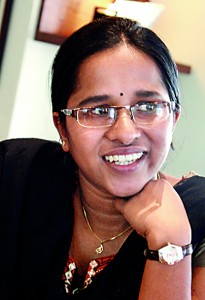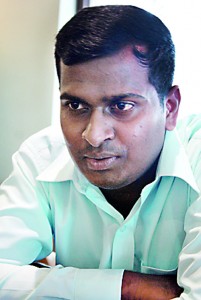Back to the estate as doctors
He hopes to become an Obstetrician & Gynaecologist and she a Paediatrician.
Having achieved the ‘peak’ of securing the MBBS (Bachelor of Medicine, Bachelor of Surgery) against all odds, while their parents have toiled on the rough slopes, they see not a mist-shrouded journey, but a clear pathway ahead of them.

Not forgetting humble beginnings: Dr. Kuppusamy Kanageswary and Dr. Balakrishnan Sathiyaraj will one day go back to their community, to serve the children and the mothers
Born to humble tea pluckers, for Kuppusamy Kanageswary and Balakrishnan Sathiyaraj, now armed with ‘Second-class Lower Divisions’ from the Rajarata University’s Faculty of Medicine & Allied Sciences in Anuradhapura, their sights are set not on personal greatness but on reaching out to the poorest of the poor, entrapped in poverty and illiteracy exacerbated by ill-health and alcoholism on the tea estates of the hill country.
The upward journey has been obstructed by many a ‘boulder’ of challenge, with the only redeeming factor being that their parents and in the case of Kanageswary, her grandmother, uncle, aunt and cousin, have made great sacrifices to help them along.
Emotion overwhelms Kanageswary, 27, and she is close to tears as she recalls her life on Dunsinane Estate Middle Division, Pundulu Oya in the Nuwara Eliya district, the younger of two daughters of tea-pluckers, R. Kuppusamy and A. Letchumy.
It was difficult to keep starvation at bay from the line-room that they called home with only her father’s wages and when Kanageswary was a toddler of three her mother was compelled to join him on the tea slopes at the crack of dawn.
With sorrowful hearts the couple did what they had to do – send their little girl to be looked after by the grandmother, maternal uncle who had a boutique and his family at Pundulu Oya.
“My relatives were wonderful. They tried to give me whatever I needed, without burdening my parents,” says Kanageswary ever-grateful for the kindness and love they lavished on her.
As her mother became weaker and thinner and unable to labour on the tea estate, her relatives saw to Kanageswary’s every need – sending her to Pundulu Oya Tamil Maha Vidyalayam from Grade 1 to the Advanced Level and forking out money not only for her uniforms, shoes, socks and books but also for the tuition classes essential if one is to fare well at national examinations.

Kanageswary
“They didn’t ask a single penny from my parents,” she says, having learnt to speak English at the Medical Faculty where the lectures were in this language.
But they too faced financial difficulties when she was in the AL class and it was her cousin, Thilageshwari, who had qualified as an engineer who took on the role of mentor and helper.
When Kanageswary had no option but to buy a stethoscope at Rs. 8,000 in the third-year of medical school, having managed with hand-me-down books from seniors except for an anatomy book which cost Rs. 3,000, it was once again to her cousin that she turned for succour. Yes, there were also the tutes that had to be bought and the Rs. 100 per day that she sparingly spent on all of her meals at the Medical Faculty canteen. “We were in trouble if the canteen was closed as the food in shops outside was more expensive,” she says.
But she persevered, just like Sathiyaraj who had a more difficult childhood. Growing up in a line-room of Somerset Estate in Nanu Oya, he soon realized the major battle that his mother, Amarawathi, a tea-plucker, and father, Balakrishnan, the estate postman, were waging to eke out a living. Being the older brother, he sat with his books in the flickering flame of the bottle-lamp, in his small mind setting as his goal the passing of the Grade 5 scholarship examination. With that milestone reached, he was able to move from the estate school to the Pundulu Oya Tamil Maha Vidyalayam while anguished to see but unable to do anything as his parents underwent severe hardship, on numerous occasions foregoing their meals, to keep aside part of their precious wages for his tuition classes. (Incidentally, it was at the Pundulu Oya Tamil Maha Vidyalayam that his path crossed that of Kanageswary.)
“There were huge problems,” he says smiling sadly in retrospect. “My parents kept urging me to become educated. From my childhood I wanted to be a doctor or lawyer, mostly a doctor because people respect healers immensely.”

Sathiyaraj
Waking up at 4 a.m. to set off for tuition classes, he would find his mother already up with a steaming cup of plain tea ready for him. Walking in exhausted, late at night after a full day’s lessons he would find both his parents, bleary-eyed, but not asleep, awaiting his return.
This was not the norm though, Sathiyaraj is quick to point out, for in many other line-rooms there was not only an alcoholic father but also a mother and much quarrelling.
He and his younger sister would be given rice and curry, but would not see their parents having their meals. For the children it would mainly be one vegetable curry, for any form of protein – meat, fish or egg – was just beyond their meagre earnings.
Medical school in Anuradhapura took some adjusting to, the climate being very different from their home-towns. It was also an eye-opener, for in their batch of 186 medicos, there were only four Tamils and 16 Muslims, but they were like one big family, helping each other and in their free time, which was rare, visiting the dagobas dotting this oldest ancient city.
Both Sathiyaraj and Kanageswary survived solely on the much-appreciated scholarships granted under the Mahapola and by the Merrill J. Fernando Charitable Foundation set up by the Chairman of the tea giant, Dilmah and the Indian-High Commission. A few others also lent a helping hand. Eating frugally, they would save every cent so as not to “disturb” their parents with pleas for money.
Although her parents are oblivious of the magnitude of Kanageswary’s achievement (“they knew I was studying, but not what I was studying”, she says), it is her uncle who has gently guided her, advising her to qualify as a doctor and then help another child stand on her own two feet.
After their year’s internship Kanages-wary and Sathiyaraj are certainly going back to their roots – irresistibly drawn to their humble beginnings to serve their community.
“The estates need us. The mothers and children need us,” says Sathiyaraj, with Kanageswary nodding vigorously in agreement, giving an indication why they are hoping to specialize in ‘obs & gyn’ and ‘paedes’.
The looks they give each other and the intangible feeling that they are more than friends and batchmates prompts the Sunday Times to ask of future plans on the marriage side.
“I am hoping to marry my childhood sweetheart,” smiles Sathiyaraj, adding, “not just yet, but in about two years once we are more settled.”
The realization then dawns, though no words are spoken. It will not be one doctor, but a ‘doctor-couple’ who will go back home to their estates to serve their kinsfolk and community.


